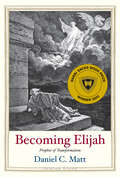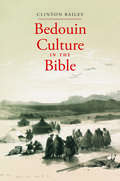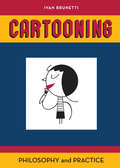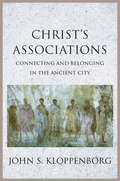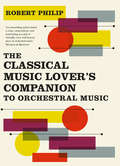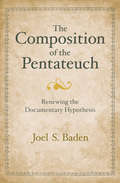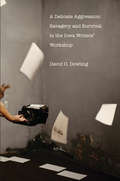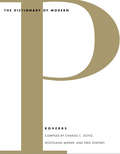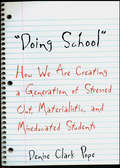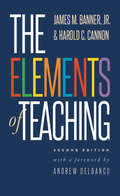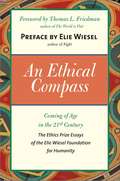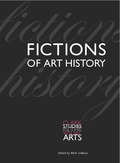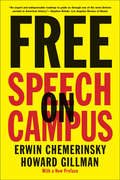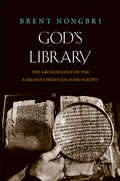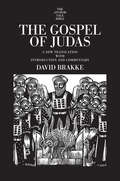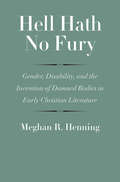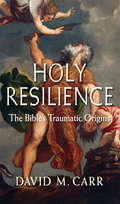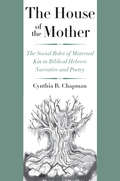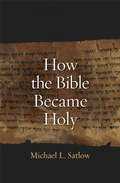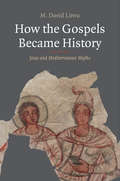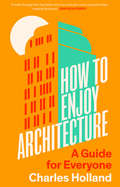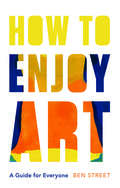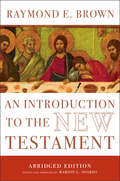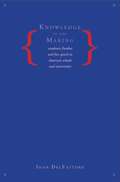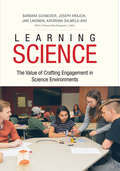- Table View
- List View
Becoming Elijah: Prophet of Transformation (Jewish Lives)
by Daniel C. MattThe story of the prophet Elijah&’s transformation from fierce zealot to compassionate hero and cherished figure in Jewish folklore &“In a series on Jewish Lives, this volume is about the Jewish life—the one that goes on forever. Becoming Elijah blends meticulous scholarship with bold literary and poetic imagination. Don&’t miss it!&”—Arthur Green, author of Judaism for the World "The author&’s erudite prose and masterful command of history and faith traditions bring his subject to vibrant life. This is an edifying and accessible chronicle of a towering religious figure."—Publishers Weekly, starred review In the Bible Elijah is a zealous prophet, attacking idolatry and injustice, championing God. He performs miracles, restoring life and calling down fire. When his earthly life ends, he vanishes in a whirlwind, carried off to heaven in a fiery chariot. Was this a spectacular death, or did Elijah escape death entirely? The latter view prevailed. Though residing in heaven, Elijah revisits earth—to help, rescue, enlighten, and eventually herald the Messiah. Because of his messianic role, Jews open the door for Elijah during each seder—the meal commemorating liberation from slavery and anticipating final redemption. How did this zealot turn into a compassionate hero—apparently the most popular figure in Jewish folklore? Becoming Elijah explores this question, tracing how Elijah develops from the Bible to Rabbinic Judaism, Kabbalah, and Jewish ritual (as well as Christianity and Islam). His transformation is pertinent and inspirational for our polarized, fanatical world.
Bedouin Culture in the Bible
by Clinton BaileyThe first contemporary analysis of Bedouin and biblical cultures sheds new light on biblical laws, practices, and Bedouin history Written by one of the world’s leading scholars of Bedouin culture, this groundbreaking book sheds new light on significant points of convergence between Bedouin and early Israelite cultures, as manifested in the Hebrew Bible. Bailey compares Bedouin and biblical sources, identifying overlaps in economic activity, material culture, social values, social organization, laws, religious practices, and oral traditions. He examines the question of whether some early Israelites were indeed nomads as the Bible presents them, offering a new angle on the controversy over the identity of the early Israelites and a new cultural perspective to scholars of the Bible and the Bedouin alike.
Cartooning: Philosophy and Practice
by Ivan BrunettiThe best cartooning is efficient visual storytelling--it is as much a matter of writing as it is of drawing. In this book, noted cartoonist and illustrator Ivan Brunetti presents fifteen distinct lessons on the art of cartooning, guiding his readers through wittily written passages on cartooning terminology, techniques, tools, and theory. Supplemented by Brunetti's own illustrations, prepared specially for this book, these lessons move the reader from spontaneous drawings to single-panel strips and complicated multipage stories. Through simple, creative exercises and assignments, Brunetti offers an unintimidating approach to a complex art form. He looks at the rhythms of storytelling, the challenges of character design, and the formal elements of comics while composing pages in his own iconic style and experimenting with a variety of tools, media, and approaches. By following the author's sophisticated and engaging perspective on the art of cartooning, aspiring cartoonists of all ages will hone their craft, create their personal style, and discover their own visual language.
Christ’s Associations: Connecting and Belonging in the Ancient City
by John S. KloppenborgA groundbreaking investigation of early Christ groups in the ancient Mediterranean As an urban movement, the early groups of Christ followers came into contact with the many small groups in Greek and Roman antiquity. Organized around the workplace, a deity, a diasporic identity, or a neighborhood, these associations gathered in small face-to-face meetings and provided the principal context for cultic and social interactions for their members. Unlike most other groups, however, about which we have data on their rules of membership, financial management, and organizational hierarchy, we have very little information about early Christ groups. Drawing on data about associative practices throughout the ancient world, this innovative study offers new insight into the structure and mission of the early Christ groups. John S. Kloppenborg situates the Christ associations within the broader historical context of the ancient Mediterranean and reveals that they were probably smaller than previously believed and did not have a uniform system of governance, and that the attraction of Christ groups was based more on practice than theological belief.
The Classical Music Lover's Companion to Orchestral Music
by Robert PhilipAn invaluable guide for lovers of classical music designed to enhance their enjoyment of the core orchestral repertoire from 1700 to 1950 Robert Philip, scholar, broadcaster, and musician, has compiled an essential handbook for lovers of classical music, designed to enhance their listening experience to the full. Covering four hundred works by sixty-eight composers from Corelli to Shostakovich, this engaging companion explores and unpacks the most frequently performed works, including symphonies, concertos, overtures, suites, and ballet scores. It offers intriguing details about each piece while avoiding technical terminology that might frustrate the non-specialist reader. Philip identifies key features in each work, as well as subtleties and surprises that await the attentive listener, and he includes enough background and biographical information to illuminate the composer’s intentions. Organized alphabetically from Bach to Webern, this compendium will be indispensable for classical music enthusiasts, whether in the concert hall or enjoying recordings at home.
The Composition of the Pentateuch
by Joel S. BadenFor well over two centuries the question of the composition of the Pentateuch has been among the most central and hotly debated issues in the field of biblical studies. In this book, Joel Baden presents a fresh and comprehensive argument for the Documentary Hypothesis. Critically engaging both older and more recent scholarship, he fundamentally revises and reorients the classical model of the formation of the Pentateuch. Interweaving historical and methodological chapters with detailed textual case studies, Baden provides a critical introduction to the history of Pentateuchal scholarship, discussions on the most pressing issues in the current debate, and a practical model for the study of the biblical text.
A Delicate Aggression: Savagery and Survival in the Iowa Writers' Workshop
by David O. DowlingA vibrant history of the renowned and often controversial Iowa Writers’ Workshop and its celebrated alumni and faculty As the world’s preeminent creative writing program, the Iowa Writers’ Workshop has produced an astonishing number of distinguished writers and poets since its establishment in 1936. Its alumni and faculty include twenty-eight Pulitzer Prize winners, six U.S. poet laureates, and numerous National Book Award winners. This volume follows the program from its rise to prominence in the early 1940s under director Paul Engle, who promoted the “workshop” method of classroom peer criticism. Meant to simulate the rigors of editorial and critical scrutiny in the publishing industry, this educational style created an environment of both competition and community, cooperation and rivalry. Focusing on some of the exceptional authors who have participated in the program—such as Flannery O’Connor, Dylan Thomas, Kurt Vonnegut, Jane Smiley, Sandra Cisneros, T. C. Boyle, and Marilynne Robinson—David Dowling examines how the Iowa Writers’ Workshop has shaped professional authorship, publishing industries, and the course of American literature.
The Dictionary of Modern Proverbs
by Wolfgang Mieder Fred R. Shapiro Charles Clay Doyle"You can't unring a bell. " "It takes a village to raise a child. " "Life is just a bowl of cherries. " We sometimes think of proverbs as expressions of ancient wisdom, but in fact new proverbs are constantly arising. This unique volume is devoted exclusively to English-language proverbs that originated in the twentieth and twenty-first centuries. The most complete and accurate such collection ever compiled,The Dictionary of Modern Proverbspresents more than 1,400 individual proverbs gathered and researched with the help of electronic full-text databases not previously used for such a project. Entries are organized alphabetically by key words, with information about the earliest datable appearance, origin, history, and meaning of each proverb. Mundane or sublime, serious or jocular, these memorable sayings represent virtually every aspect of the modern experience. Readers will find the book almost impossible to put down once opened; every page offers further proof of the immense vitality of proverbs and their colorful contributions to the oral traditions of today.
"Doing School": How We Are Creating a Generation of Stressed Out, Materialistic, and Miseducated Students
by Denise Clark PopeThis book offers a highly revealing-and troubling-view of today's high school students and the ways they pursue high grades and success. Denise Pope, veteran teacher and curriculum expert, follows five motivated and successful students through a school year, closely shadowing them and engaging them in lengthy reflections on their school experiences. What emerges is a double-sided picture of school success. On the one hand, these students work hard in school, participate in extracurricular activities, serve their communities, earn awards and honors, and appear to uphold school values. But on the other hand, they feel that in order to get ahead they must compromise their values and manipulate the system by scheming, lying, and cheating. In short, they "do school"-that is, they are not really engaged with learning nor can they commit to such values as integrity and community. The words and actions of these five students-two boys and three girls from diverse ethnic and socioeconomic backgrounds-underscore the frustrations of being caught in a "grade trap" that pins future success to high grades and test scores. Their stories raise critical questions that are too important for parents, educators, and community leaders to ignore. Are schools cultivating an environment that promotes intellectual curiosity, cooperation, and integrity? Or are they fostering anxiety, deception, and hostility? Do today's schools inadvertently impede the very values they claim to embrace? Is the "success" that current assessment practices measure the kind of success we want for our children?
The Elements of Teaching: Second Edition
by Andrew Delbanco Harold C. Cannon James M. BannerA newly revised edition of this classic work, exploring the diverse qualities essential for teaching in today’s educational environment. According to Banner and Cannon, to be an effective teacher requires much more than technical skill. Great teaching is an art that combines a wide range of intellectual, moral, and emotional components. This classic work explores the qualities of mind and spirit that are essential for those seeking to help others acquire knowledge and understanding. It analyzes the specific qualities of successful teachers: learning, authority, ethics, order, imagination, tenacity, compassion, patience, character, and pleasure. Written in a clear and engaging style and applicable to all levels of teaching—be it in schools and universities or on athletic fields and in the home—the book encourages teachers to consider how they might enlarge their understanding of the great art of teaching.
An Ethical Compass: The Ethics Prize Essays of the Elie Wiesel Foundation for Humanity
by Thomas L. FriedmanIn 1986, Elie Wiesel received the Nobel Peace Prize in recognition of his victory over “the powers of death and degradation, and to support the struggle of good against evil in the world.” Soon after, he and his wife, Marion, created the Elie Wiesel Foundation for Humanity. A project at the heart of the Foundation’s mission is its Ethics Prize—a remarkable essay-writing contest through which thousands of students from colleges across the country are encouraged to confront ethical issues of personal significance. The Ethics Prize has grown exponentially over the past twenty years. “Of all the projects our Foundation has been involved in, none has been more exciting than this opportunity to inspire young students to examine the ethical aspect of what they have learned in their personal lives and from their teachers in the classroom,” writes Elie Wiesel. Readers will find essays on Bosnia, the genocide in Rwanda, sweatshops and globalization, and the political obligations of the mothers of Argentina’s Disappeared. Other essays tell of a white student who joins a black gospel choir, a young woman who learns to share in Ladakh, and the outsize implications of reporting on something as small as a cracked windshield. Readers will be fascinated by the ways in which essays on conflict, conscience, memory, illness (Rachel Maddow’s essay on AIDS appears), and God overlap and resonate with one another. These essays reflect those who are “sensitive to the sufferings and defects that confront a society yearning for guidance and eager to hear ethical voices,” writes Elie Wiesel. “And they are a beacon for what our schools must realize as an essential component of a true education.”
Fictions of Art History
by Joanna Scott Alexander Nemerov Marianna Torgovnick Cole Swensen Marina Warner Caroline Vout Michael Hatt Paul Barolsky Gloria Kury Maria H. Loh Ralph Lieberman Mark Ledbury Thomas CrowFictions of Art History, the most recent addition to the Clark Studies in the Visual Arts series, addresses art history's complex relationships with fiction, poetry, and creative writing. Inspired by a 2010 conference, the volume examines art historians' viewing practices and modes of writing. How, the contributors ask, are we to unravel the supposed facts of history from the fictions constructed in works of art? How do art historians employ or resist devices of fiction, and what are the effects of those choices on the reader? In styles by turns witty, elliptical, and plain-speaking, the essays in Fictions of Art History are fascinating and provocative critical interventions in art history.
Free Speech on Campus
by Erwin Chemerinsky Howard GillmanCan free speech coexist with an inclusive campus environment? Hardly a week goes by without another controversy over free speech on college campuses. On one side, there are increased demands to censor hateful, disrespectful, and bullying expression and to ensure an inclusive and nondiscriminatory learning environment. On the other side are traditional free speech advocates who charge that recent demands for censorship coddle students and threaten free inquiry. In this clear and carefully reasoned book, a university chancellor and a law school dean—both constitutional scholars who teach a course in free speech to undergraduates—argue that campuses must provide supportive learning environments for an increasingly diverse student body but can never restrict the expression of ideas. This book provides the background necessary to understanding the importance of free speech on campus and offers clear prescriptions for what colleges can and can’t do when dealing with free speech controversies.
God's Library: The Archaeology of the Earliest Christian Manuscripts
by Brent NongbriA provocative book from a highly original scholar, challenging much of what we know about early Christian manuscripts In this bold and groundbreaking book, Brent Nongbri provides an up-to-date introduction to the major collections of early Christian manuscripts and demonstrates that much of what we thought we knew about these books and fragments is mistaken. While biblical scholars have expended much effort in their study of the texts contained within our earliest Christian manuscripts, there has been a surprising lack of interest in thinking about these books as material objects with individual, unique histories. We have too often ignored the ways that the antiquities market obscures our knowledge of the origins of these manuscripts. Through painstaking archival research and detailed studies of our most important collections of early Christian manuscripts, Nongbri vividly shows how the earliest Christian books are more than just carriers of texts or samples of handwriting. They are three-dimensional archaeological artifacts with fascinating stories to tell, if we’re willing to listen.
The Gospel of Judas: A New Translation with Introduction and Commentary (The Anchor Yale Bible Commentaries)
by David BrakkeA new translation and commentary on the extracanonical Coptic text that describes Judas&’ special status among Jesus&’ disciples Since its publication in 2006, The Gospel of Judas has generated remarkable interest and debate among scholars and general readers alike. In this Coptic text from the second century C.E., Jesus engages in a series of conversations with his disciples and with Judas, explaining the origin of the cosmos and its rulers, the existence of another holy race, and the coming end of the current world order. In this new translation and commentary, David Brakke addresses the major interpretive questions that have emerged since the text&’s discovery, exploring the ways that The Gospel of Judas sheds light on the origins and development of gnostic mythology, debates over the Eucharist and communal authority, and Christian appropriation of Jewish apocalyptic eschatology. The translation reflects new analyses of the work&’s genre and structure, and the commentary and notes provide thorough discussions of the text&’s grammar and numerous lacunae and ambiguities.
Hell Hath No Fury: Gender, Disability, and the Invention of Damned Bodies in Early Christian Literature (The Anchor Yale Bible Reference Library)
by Meghan R. HenningThe first major book to examine ancient Christian literature on hell through the lenses of gender and disability studies Throughout the Christian tradition, descriptions of hell&’s fiery torments have shaped contemporary notions of the afterlife, divine justice, and physical suffering. But rarely do we consider the roots of such conceptions, which originate in a group of understudied ancient texts: the early Christian apocalypses. In this pioneering study, Meghan Henning illuminates how the bodies that populate hell in early Christian literature—largely those of women, enslaved persons, and individuals with disabilities—are punished after death in spaces that mirror real carceral spaces, effectually criminalizing those bodies on earth. Contextualizing the apocalypses alongside ancient medical texts, inscriptions, philosophy, and patristic writings, this book demonstrates the ways that Christian depictions of hell intensified and preserved ancient notions of gender and bodily normativity that continue to inform Christian identity.
Holy Resilience
by David M. CarrHuman trauma gave birth to the Bible, suggests eminent religious scholar David Carr. The Bible’s ability to speak to suffering is a major reason why the sacred texts of Judaism and Christianity have retained their relevance for thousands of years. In his fascinating and provocative reinterpretation of the Bible’s origins, the author tells the story of how the Jewish people and Christian community had to adapt to survive multiple catastrophes and how their holy scriptures both reflected and reinforced each religion’s resilient nature. Carr’s thought-provoking analysis demonstrates how many of the central tenets of biblical religion, including monotheism and the idea of suffering as God’s retribution, are factors that provided Judaism and Christianity with the strength and flexibility to endure in the face of disaster. In addition, the author explains how the Jewish Bible was deeply shaped by the Jewish exile in Babylon, an event that it rarely describes, and how the Christian Bible was likewise shaped by the unspeakable shame of having a crucified savior.
The House of the Mother: The Social Roles of Maternal Kin in Biblical Hebrew Narrative and Poetry
by Prof. Cynthia R. ChapmanA novel approach to Israelite kinship, arguing that maternal kinship bonds played key social, economic, and political roles for a son who aspired to inherit his father's household Upending traditional scholarship on patrilineal genealogy, Cynthia Chapman draws on twenty years of research to uncover an underappreciated yet socially significant kinship unit in the Bible: "the house of the mother. " In households where a man had two or more wives, siblings born to the same mother worked to promote and protect one another's interests. Revealing the hierarchies of the maternal houses and political divisions within the national house of Israel, this book provides us with a nuanced understanding of domestic and political life in ancient Israel.
How the Bible Became Holy
by Michael L SatlowBeginning with Walt Whitman singing hymns at a wounded soldier's bedside during the Civil War, this surprising and vivid anthology ranges straight through to the twenty-first century to end with Francine Prose crying tears of complicated joy at the sight of Whitman's words in Zuccotti Park during the brief days of the Occupy movement. The first anthology of its kind, Radiant Truths gathers an exquisite selection of writings by both well-known and forgotten American authors and thinkers, each engaged in the challenges of writing about religion, of documenting "things unseen." Their contributions to the genre of literary journalism-the telling of factual stories using the techniques of fiction and poetry-make this volume one of the most exciting anthologies of creative nonfiction to have emerged in years. Jeff Sharlet presents an evocative selection of writings that illuminate the evolution of the American genre of documentary prose. Each entry may be savored separately, but together the works enrich one another, engaging in an implicit and continuing conversation that reaches across time and generations.Including works by: Walt Whitman Henry David Thoreau Mark Twain Meridel Le Sueur Zora Neale Hurston Mary McCarthy James Baldwin Norman Mailer Ellen Willis Anne Fadiman John Jeremiah Sullivan Francine Prose Garry Wills and many others
How the Gospels Became History: Jesus and Mediterranean Myths (Synkrisis)
by M. David LitwaA compelling comparison of the gospels and Greco-Roman mythology which shows that the gospels were not perceived as myths, but as historical records Did the early Christians believe their myths? Like most ancient—and modern—people, early Christians made efforts to present their myths in the most believable ways. In this eye-opening work, M. David Litwa explores how and why what later became the four canonical gospels take on a historical cast that remains vitally important for many Christians today. Offering an in-depth comparison with other Greco-Roman stories that have been shaped to seem like history, Litwa shows how the evangelists responded to the pressures of Greco-Roman literary culture by using well-known historiographical tropes such as the mention of famous rulers and kings, geographical notices, the introduction of eyewitnesses, vivid presentation, alternative reports, and so on. In this way, the evangelists deliberately shaped myths about Jesus into historical discourse to maximize their believability for ancient audiences.
How to Enjoy Architecture: A Guide for Everyone
by Charles HollandCharles Holland challenges us to look beyond the day-to-day familiarity of buildings to rediscover the pleasure of experiencing architecture Architecture is bound up with our daily lives but, for most of us, it is experienced as a blur of habit. Our reactions towards the buildings that surround us are often culturally generated, and we experience them in ways that are immediate but often mundane. How to Enjoy Architecture: A Guide for Everyone encourages us to move beyond this and, instead, really look at buildings. Renowned architect Charles Holland talks about the buildings and architects that excite and inspire him, and the ideas and principles through which we can engage with architecture. By breaking buildings down into categories such as materials, structure, space, and use, Holland guides us through drastically different styles and building types—from the satisfying symmetry of a Queen Anne house to the thrill of a high-tech tower, or the social ideals that lie behind a housing estate. In doing so, he demonstrates how looking at, experiencing, and using architecture can bring joy in itself. "A book that will enrich any encounter with a building, it made me want to look harder and be more curious. We are led playfully through the fundamentals of architecture so that we might enjoy the details and the poetry of buildings all the more. A walk through the city feels more fun and also more profound after reading this book." Grayson Perry, artist "We so often encounter architecture when it goes wrong, or offends us with its looks. Holland, though, is the perfect, clear-headed tour guide to help us appreciate it with newly sharpened senses and fall in love again – even those buildings we think we hate." Tom Dyckhoff, academic and broadcaster "An enlightening and urbane exploration of architecture that resonates beyond conventional chronological histories" Catherine Slessor, architecture writer and critic
How to Enjoy Art: A Guide for Everyone
by Ben StreetAn entertaining and lively guide to rediscovering the pleasure in artHow to Enjoy Art: A Guide for Everyone provides the tools to understand and enjoy works of art. Debunking the pervasive idea that specialist knowledge is required to understand and appreciate art, instead How to Enjoy Art focuses on experience and pleasure, demonstrating how anyone can find value and enjoyment in art. Examples from around the world and throughout art history—from works by Fra Angelico and Berthe Morisot to Kazuo Shiraga and Kara Walker—are used to demonstrate how a handful of core strategies and skills can help enhance the experience of viewing art works. With these skills, anyone can encounter any work of art—regardless of media, artist or period—and find some resonance with their own experiences. How to Enjoy Art encourages us to rediscover the fundamental pleasure in viewing art.
An Introduction to the New Testament: The Abridged Edition
by Raymond E. Brown Marion SoardsSince its publication in 1997, Raymond Brown's Introduction to the New Testament has been widely embraced by modern readers seeking to understand the Christian Bible. Acknowledged as a paragon of New Testament studies in his lifetime, Brown was a gifted communicator who wrote with ease and clarity.  Abridged by Marion Soards, who worked with Brown on the original text, this new, concise version maintains the essence and centrist interpretation of the original without tampering with Brown's perspective, insights, or conclusions. The biblical writings themselves remain the focus, but there are also chapters dealing with the nature, origin, and interpretation of the New Testament texts, as well as chapters concerning the political, social, religious, and philosophical world of antiquity. Furthermore, augmenting Brown's commentary on the New Testament itself are topics such as the Gospels' relationship to one another; the form and function of ancient letters; Paul's thought and life, along with his motivation, legacy, and theology; a reflection on the historical Jesus; and a survey of relevant Jewish and Christian writings.  This comprehensive, reliable, and authoritative guidebook is now more accessible for novices, general readers, Bible study groups, ministers, scholars, and students alike.
Knowledge in the Making: Academic Freedom and Free Speech in America's Schools and Universities
by Joan DelfattoreHow free are students and teachers to express unpopular ideas in public schools and universities? Not free enough, Joan DelFattore suggests. Wading without hesitation into some of the most contentious issues of our times, she investigates battles over a wide range of topics that have fractured school and university communities--homosexuality-themed children's books, research on race-based intelligence, the teaching of evolution, the regulation of hate speech, and more--and with her usual evenhanded approach offers insights supported by theory and by practical expertise. Two key questions arise: What ideas should schools and universities teach? And what rights do teachers and students have to disagree with those ideas? The answers are not the same for K-12 schools as they are for public universities. But far from drawing a bright line between them, DelFattore suggests that we must consider public education as a whole to determine how--and how successfully--it deals with conflicting views. When expert opinion clashes with popular belief, which should prevail? How much independence should K-12 teachers have? How do we foster the cutting-edge research that makes America a world leader in higher education? What are the free-speech rights of students? This uniquely accessible and balanced discussion deserves the full attention of everyone concerned with academic goals and agendas in our schools.
Learning Science: The Value of Crafting Engagement in Science Environments
by Barbara Schneider Joseph Krajcik Jari LavonenAn innovative, internationally developed system to help advance science learning and instruction for high school students This book tells the story of a $3.6 million research project funded by the National Science Foundation aimed at increasing scientific literacy and addressing global concerns of declining science engagement. Studying dozens of classrooms across the United States and Finland, this international team combines large-scale studies with intensive interviews from teachers and students to examine how to transform science education. Written for teachers, parents, policymakers, and researchers, this book offers solutions for matching science learning and instruction with newly recommended twenty-first-century standards.
